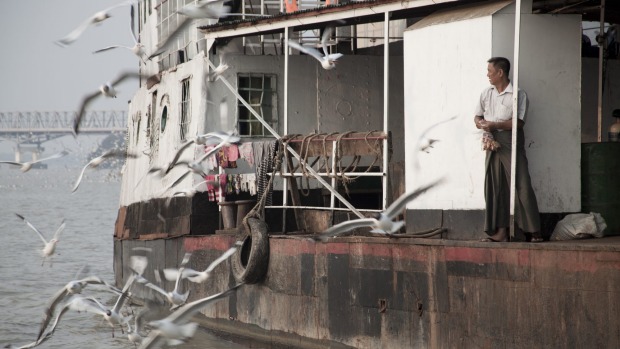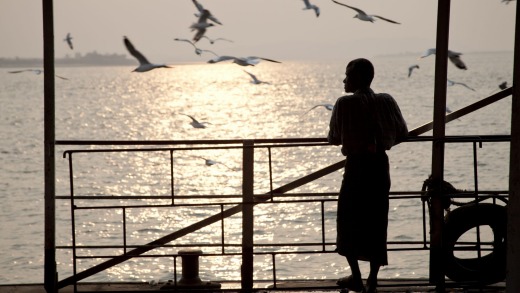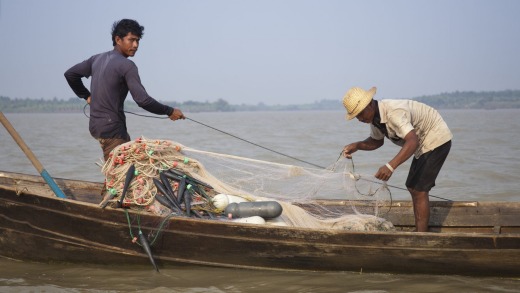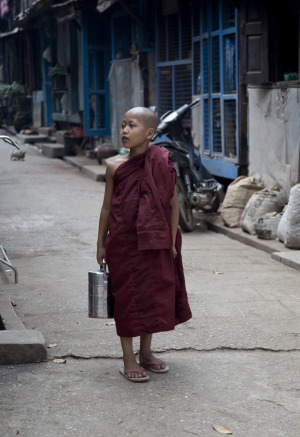
I've seen some odd things on my travels: sideshow performers hammering nails into their noses on Coney Island, men toying with venomous cobras in Thailand, but in its own way, this place is right up there.
Inside the nunnery there's a faintly musty smell. In the front corridor, two women dressed in pink robes sit grooming dogs, their heads shaven clean. Next door, a room with wooden floors resembling a Scouts hall is cluttered with curiosities.
Two giant white teddy bears stare back at me with black lifeless eyes from inside a perspex box. A goat's head, sprayed gold, has been nailed to a pillar, plastic floral chandeliers hanging from its horns. The walls are covered with faded, framed photos of nuns wearing ludicrously oversized glasses. It's all very peculiar, made all the more so because it's not trying to be; there's an earnest naivety to the whole set-up that's as endearing as it is eccentric.

I'm on Shampoo Island a 30-minute boat ride off the northern coast of Mawlamyine, Myanmar's fourth largest city and the place where George Orwell wrote his heart-wrenching 1936 essay Shooting an Elephant.
It has a population of just a hundred, made up mostly of monks and nuns (and their pet dogs) who have come here for a life of intense devotion to Buddhist scriptures.
The isle earned its moniker from an annual ceremony dating back to the Ava period, when Burmese kings would come to ceremoniously wash their hair in the sacred well, said to be an omen of good luck and prosperity.

In the twilight, the whole place has a tranquil, almost idyllic air. Orchids and other tropical plants in terracotta pots dangle from the sides of sloping roofs above blue and white tiled mosaic floors and hand-carved wooden elephants.
An impeccably maintained paved pathway cuts through fringed palm trees and pagodas glinting in the fading sun.
Following the sound of sweeping, I come across a young monk going about his daily chores.

"We get up each day at 4.30am for prayers, then we eat a simple meal of noodles or rice soup, maybe dried fish if we are lucky," he says.
"I study Buddhist teachings, maintain the island and school the younger generation until 10.30 at night. Our only rest is a game of cane ball in the afternoon if we get time."
It's clear the path to enlightenment is not an easy one, and though he admits that life on the island is hard, when I press further, he simply shakes his head ruefully, refusing to elaborate further.
Heading home, we scramble back onto our blue wooden longboat with its multicoloured plastic chairs, worn green lace curtains and smoke-belching diesel engine.
Eschewing comfort in favour of better views, a couple of us opt to ride home on the roof.
Rattling our way back to the stupa-capped coastline amid periodic plumes of exhaust clouds, we watch the softening sun cast fingers of amber across the murky brown surface of the Salween River. Fishermen toss worn nets over the sides of their boats as, from the stern, our driver chain-smokes strong cigarettes, his expression never changing.
Finally we near the port wall of Mawlamyine, where old men throw scraps to manic seagulls from the side of a rusted ferry.
It's a scene from another time, a simpler time, where ancient kinds would come to bathe in the waters and a policeman named George Orwell roamed the streets with a musket slung across his shoulder.
MORE INFORMATION
Go-Myanmar.com.
GETTING THERE
Thai airways fly direct from Sydney to Bangkok with connections to Yangon, see thaiairways.com.
TOURING THERE
The Intrepid Travel 14-day Burma to Thailand trip travels south from Yangon to Bangkok taking in Mawlamyine and Shampoo Island. From $2400; see intrepidtravel.com